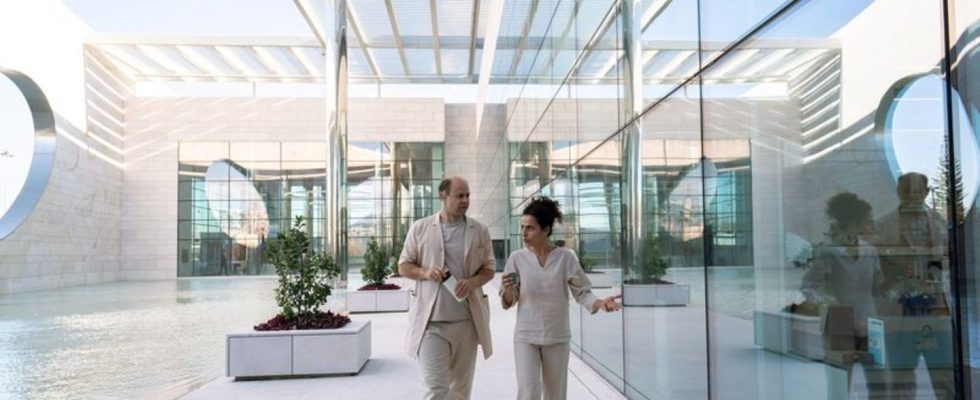TV trend
How TV makers are now daring to imagine dark visions of the future
Moritz Führmann and Sesede Terziyan in a scene from “Charité”. The ARD cult series jumps to the year 2049 in the new season. Photo
© Armanda Claro/ARD Degeto/Arte/Ufa Fiction/dpa
The Sky drama series “Helgoland 513” takes place in 2039 and the new season of the ARD hit “Charité” only takes place in 2049. Will that work well with German television audiences?
Crime stories always work. And local film-like productions are also considered Secret weapons of German television. In the German TV market, on the other hand, anything that deviates from this and can be assigned to genres such as horror, fantasy or science fiction appears daring. This spring, however, there are two elaborate productions that focus on near-future scenarios.
The seven-part dystopian drama series “Helgoland 513” (from March 15th), which takes place in the year 2039, starts on Sky (and the streaming service Wow). And the fourth season of the medical series “Charité” will soon be shown on the first, the six episodes of which are set in 2049 (ARD media library from April 5th; TV from April 9th).
“The “Near Future” genre focuses on showing future scenarios and playing through their effects on people and society,” says political scientist Isabella Hermann, who published the book “Introductory Science Fiction.” This questions the present and stimulates reflection. “Current challenges are usually extrapolated into the negative, such as dehumanization caused by advancing technology or the threat to democracy and freedom caused by populism,” says Hermann. This offers scope for thrilling dramaturgies and stories.
In the case of “Charité”, the company Ufa Fiction produced on behalf of ARD Degeto, Arte and MDR, and a lot of the filming was done in sunny Portugal.
“Writing medical history of the future is even possible? In the end, of course, it’s up to the viewers to decide,” said ARD fiction coordinator Jörg Schönenborn, in the accompanying press release. But the season has been researched with great care and packs today’s findings about the opportunities and challenges of tomorrow’s medicine into a plausible narrative. “This journey through time into a world in which we encounter many questions that already concern us today has what it takes to provide material for conversation and to provide stimulating entertainment in the best sense of the word.”
Climate change and polyamory in Berlin
Will it be well received by German TV audiences if series are not set in the here and now, but in 25 years? Will the millions of viewers of “Charité” accept the new approaches?
For example, the series shows the consequences of climate change; temperatures of up to 45 degrees and heavy rainfall have become normal in the German capital; In medicine, cancer vaccinations, early detection of Alzheimer’s disease and telemedicine are standard, and in everyday life algorithms determine things like shopping or going to the doctor.
But a lot of things are different about the series socially and in the choice of main characters. In short: white heterosexuals are not the focus. Germany is naturally shown as an immigration society, for example with a Health Minister Nguyen. Top researcher Maral Safadi also doesn’t have a husband, but a wife, and polyamory, a love triangle, is also part of the plot.
Pandemic and apocalypse on Helgoland
The “star-studded end-time vision “Helgoland 513”,” as Sky itself calls it, takes place ten years earlier than the new “Charité” season. Ufa Fiction also produced here.
“In the year 2039, a murderous pandemic will decimate humanity. In Germany, 513 residents are holed up on the island of Heligoland. Because resources are scarce, another resident has to die for every newborn. If no volunteers come forward, a ranking is determined based on an evaluation of performance and missteps, who gets killed.” The main roles of the island boss and the only doctor on the island are played by Martina Gedeck and Alexander Fehling, directed by Hollywood director Robert Schwentke (“RED – Older. Harder. Better.”).
“I liked the subject, the unusual way of dealing with the apocalypse,” says actress Gedeck in a Sky interview about the series. It’s not just about horror and fear of the future. She also sees the playful element. “The characters are human and there is a comedic level. It is important to maintain lightness. As long as people feel joy, nothing is lost.”

